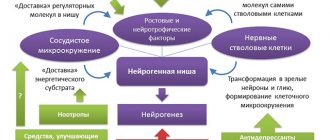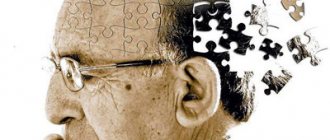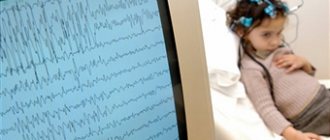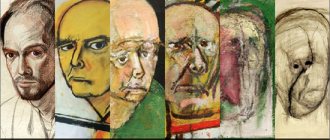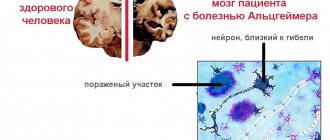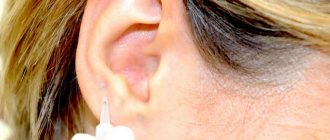Alcoholic dementia (Latin dementia - madness) refers to organic brain damage due to many years of alcohol abuse. In heavy drinkers, ethanol provokes the development of cognitive, emotional and personal disorders; previously acquired experience and everyday skills are irretrievably lost. According to world statistics, about 46 million people suffer from alcoholic dementia. Most often, the problem is faced by men over 55 years of age, but in recent years there has been a tendency towards “rejuvenation” of the disease.
Causes, risk factors and course features
The mechanism of the appearance and development of alcohol dementia is closely related to addiction to strong alcoholic beverages. After entering the body, ethyl alcohol is quickly distributed by the blood to all parts of the body, then sent to the liver, where it is broken down into acetaldehyde. It is this dangerous toxin that poisons the brain, destroys nerve cells and impairs mental activity.
Alcohol-related dementia is associated with the following pathological conditions:
- Cerebral ischemia.
- Traumatic brain injury.
- Kidney and liver failure.
- Atherosclerosis, arterial stenosis.
- Diabetes.
- Neurodegenerative diseases (Alzheimer's disease, Parkinson's disease).
Alcohol-induced dementia develops smoothly and is reversible in the early stages. However, if a person continues to drink, then insufficient blood supply to the brain and loss of thiamine lead to damage to the frontal lobes. There is a disruption in the function of neurotransmitters that regulate the patient’s emotional background, memory weakens, psychosis and anxiety disorders occur.
Alcoholic dementia ends in complete collapse of the personality.
Hypertension, metabolic disorders and liver cirrhosis are risk factors that accelerate the degradation processes in alcoholic dementia. Tobacco smoking and frequent stressful situations provoke the development of dementia, and genetic predisposition to the disease also plays an important role.
Causes
The cause of dementia due to alcohol abuse can be many factors, including the direct neurotoxic effect of ethyl alcohol on the tissues of the central nervous system and concomitant pathologies - Alzheimer's disease, pellagra (vitaminosis), correlating with a lack of nicotinic acid, repeated head injuries and meningitis, which occurs in a chronic form.
Pathologies such as sleep apnea (episodes of cessation of breathing), hepatic encephalopathy, leukoencephalopathy (damage to white brain matter) of toxic origin, vascular dementia often accompany alcoholism and are involved in the development of cognitive dysfunction. The pathogenesis of dementia in alcoholics is based on the same mechanisms as in encephalopathy and psychosis of alcoholic origin. Main pathogenetic mechanisms:
- Lack of thiamine (vitamin B1), caused by impaired absorption in the small intestine and poor nutrition.
- Reducing the concentration of GABA (Gamma-aminobutyric acid is the most important neurotransmitter that regulates inhibition processes in the central nervous system) in the nervous tissue.
- Increased concentration and activity of glutamate, which induces neurotoxic effects.
The combined influence of these factors correlates with damage to the brain matter, which affects all physiological processes in the body, including cognitive functions. Secondary factors associated with the toxic effects of ethyl alcohol include increased permeability of the blood-brain barrier structures and damage to liver tissue, which leads to disruption of its functions.
Main symptoms and signs
Alcoholic dementia begins with the appearance of childhood character traits. It is difficult for the patient to argue his point of view; decidophobia and egocentrism are observed. The first symptoms of dementia are often attributed to a midlife crisis or simple nervous exhaustion. Korsakoff's syndrome is a precursor to alcoholic dementia. The pathopsychological disorder combines vitamin B1 deficiency and fixation amnesia. The patient easily recalls events that happened in the distant past, but cannot remember yesterday.
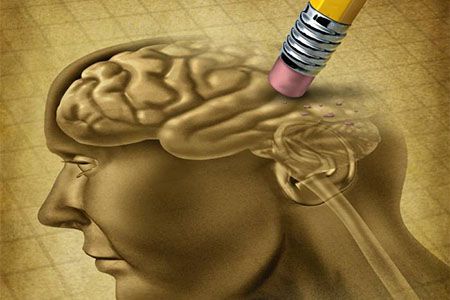
In addition, alcoholic dementia manifests itself:
- Decreased volitional abilities.
- Social withdrawal.
- Memory lapses.
- Speech impairment.
- Muscle tremors.
- Loss of ability to learn, analyze and generalize.
Alcoholic dementia is accompanied by disorientation in space and loss of coordination. With dementia, gait becomes unsteady, drowsiness and rigid thinking are the norm for a person with dementia. As a result of damage to subcortical structures, a “fixation” on one thought or feeling occurs. The patient becomes infantile, ceases to take part in the life of the family, and the range of interests narrows.
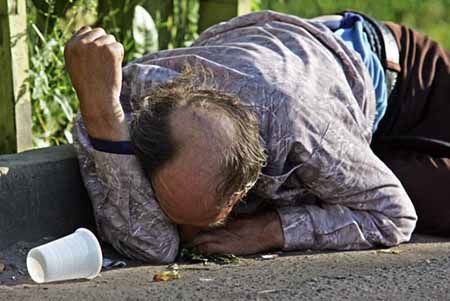
Stages and methods of treatment of alcoholic dementia
First of all, the course of treatment for dementia that appears due to alcohol abuse begins with instilling in the patient the need to eliminate alcohol as the main cause of the disease forever. Conversations about the dangers of alcoholism are carried out with a sober person , since under the influence of ethanol he is not able to adequately perceive the necessary information.
Treatment of alcoholic dementia is complex. At the first stage, the patient’s condition is stabilized and pronounced symptoms of intoxication are relieved. In parallel, treatment of concomitant diseases that complicate the course of the disease is required.
At an early stage, with mild disorders, the following drugs :
- nootropics to stimulate mental functions and memory;
- neuroprotectors that prevent the death of brain tissue;
- restoring cerebral circulation;
- increasing the rheological characteristics of blood, reducing the risk of thrombosis;
- improving metabolism.
All efforts of doctors are aimed at restoring the functions of brain vessels and stimulating the formation of new neurons. In difficult cases, detoxification measures are necessary.

Insomnia and irritability that accompany dementia are relieved with sedative medications. Antidepressants are prescribed to patients who become depressed. In severe cases, with psychomotor agitation, the patient is calmed with haloperidol, which does not cause drowsiness. Herbal tinctures , vitamin preparations, minerals, and fatty acids are widely used They help with vascular problems, cognitive disorders, act as antioxidants, reduce the risk of stroke, heart attack, intellectual disorders and memory loss.
It is very important for the patient to be under constant supervision and in contact with the outside world. To restore orientation in space and time, it is necessary to place a clock and calendar in the room, and the patient must be constantly reminded of necessary everyday activities.
Alcodenia cannot be cured if the disease is advanced. The person becomes immobilized and will constantly need sanitary and medical care at home.
Types and forms of the disease
The described illness occurs in stages: mild, moderate and severe degrees of alcoholic dementia are distinguished. In fact, alcodementia differs from ordinary dementia only in that the causative factor is known.
Depending on the nature of the damage to nerve cells, there are:
- Cortical type of dementia. The cerebral cortex is predominantly affected.
- Subcortical view. The least dangerous type of dementia, in which the connection between the subcortical formations and the cortex is disrupted.
Many vascular pathologies associated with alcohol dependence provoke the development of cortical-subcortical dementia. The lacunar form of the disease spreads to isolated areas of the brain and is always accompanied by a decrease in short-term memory. The total form of dementia affects the frontal lobes of the brain, which leads to complete degradation of the personality.
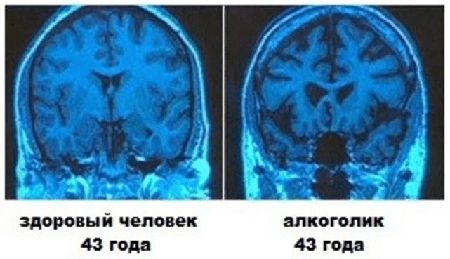
Causes of alcoholic dementia
The mechanism of action of ethanol on the body is quite complex. The causes of alcoholic dementia are the long-term regular effects of alcohol on the brain. The main directions of influence of alcohol are brain intoxication, damage to the nervous system by ethanol processing products, and disruption of blood flow in brain cells .
After entering the stomach, alcohol immediately penetrates the blood, which carries it to all organs, causing severe poisoning. Nerve cells lost under the influence of a harmful process are not capable of recovery, so the alcoholic develops an intellectual disorder.
Ethanol and its derivatives negatively affect vascular tone, causing a deterioration in blood flow. Cells suffering from a lack of oxygen and nutrients die, the walls of brain vessels begin to collapse. The pathological process causes alcoholic polyneuropathy, which may be accompanied by dementia . The likelihood of developing dementia due to chronic craving for alcohol is very high.
Several categories of patients are at risk:
- elderly;
- diabetics;
- long-term smokers;
- suffering from cardiovascular diseases;
- genetically predisposed.
Medical statistics indicate an increase in cases of dementia in poorly educated people with a minimal range of hobbies . They are more likely than others to develop chronic alcoholism, which leads to dementia.
Diagnostic measures
Alcohol-induced dementia is difficult to diagnose in the early stages, so a physical examination, conversation with the patient, or interviews with relatives do not provide a clear picture of the dynamics of the disease. In the case of alcoholic dementia, magnetic resonance imaging and ultrasound scanning are highly informative. Using MRI, you can obtain a clear image of the brain in three dimensions, assess the patency of blood vessels, and the level of a person’s mental activity. Ultrasound scanning of the brachiocephalic vessels makes it possible to determine the exact locations of their deformation. To exclude functional pseudodementia caused by vitamin deficiency, additional examinations (blood test for vitamins and mineralogram) will be needed.
Signs of acute alcohol poisoning.
| Symptoms | Blood alcohol level, g/l (%o) |
| Euphoria, ataxia, loquacity, hypalgesia | 0,25—1 |
| Noisiness, abnormal behavior, skin hyperemia, ataxia, nystagmus, dysarthria | 1—2 |
| Nausea, vomiting, drowsiness, diplopia, wide, sluggish pupils, severe ataxia | 2—3 |
| Hypothermia, cold sweat, stupor, severe dysarthria, general anesthesia, wheezing, hypoventilation, coma | More |
Treatment
Diagnosis and treatment of alcoholic dementia are the responsibility of specialized doctors: neurologist, narcologist, endocrinologist. To overcome a persistent addiction to alcohol, one cannot do without psychological support from both specialists and the patient’s immediate environment. Conversations about the dangers of alcoholic beverages should be conducted with a sober person, otherwise the words will be misinterpreted.
The therapeutic regimen is selected taking into account the actual condition of the patient, alcohol history, and tolerability of pharmaceuticals. In the presence of concomitant pathologies (hypertension, diabetes mellitus, etc.) complicating the course of dementia, complex treatment is indicated. Replacement therapy can restore the neurotransmitter balance in dementia, and symptomatic therapy eliminates toxic signs - nausea, weakness or dizziness.
Medicines to help
In the fight against alcoholic dementia, all efforts should be directed toward restoring the normal functioning of the blood vessels of the brain. At the same time, they stimulate the formation and growth of new neurons and affect the higher integrative functions of the brain. In severe cases, detoxification therapy is required.
For alcoholic dementia the following is prescribed:
- Nootropics. Glycine, Piracetam, Encephabol improve the patient’s attention, memory and thinking abilities.
- Vasoactive drugs (Vinpocetine, Ginkgo Biloba). They improve the rheological properties of blood and prevent blood clots in dementia.
- Drugs that restore cerebral circulation (Cinnarizine and its analogues).
- Neuroprotectors. Prevents the death of brain cells.
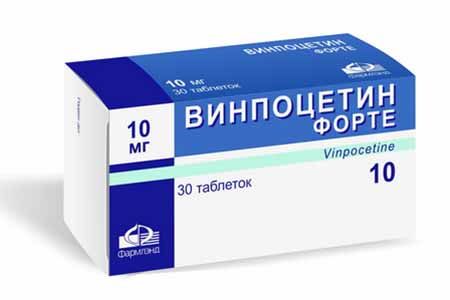
Psychomotor overexcitation is eliminated with Haloperidol. Sedatives or antidepressants relieve apathy or nervousness; sleeping pills (Bromizoval, Zolpidem, Sonmil, etc.) will help restore healthy sleep in alcoholic dementia. Chronic alcoholism depresses the human immune system, so the patient is prescribed vitamin and mineral complexes.
Traditional methods
Traditional methods are based on basic concepts about the properties of medicinal herbs. Alternative medicine perfectly complements drug therapy and reduces the negative impact of anti-dementia drugs on internal organs. Tea made from mint leaves or valerian root will help relieve withdrawal symptoms and calm the nerves. Alcohol tinctures from lemongrass, ginseng or eleutherococcus increase concentration.
Several effective “grandmother’s” recipes for alcoholic dementia:
- Rowan tincture.
Pour 50 g of rowan bark with 250 ml of water. Boil the product over low heat for 10 minutes. After 5 hours, strain the infusion. For alcoholic dementia, you should drink 50 ml of the medicine at least 3 times a day before meals.

- Carrot-beet juice.
Mix beet and carrot juice in a ratio of 1:4. To improve memory in dementia, it is recommended to take 500 ml of the drink per day. Beetroot juice can be replaced with blueberry juice.
Explanations for the medical history
The patient developed a picture of diffuse dementia. In all likelihood, the immediate cause of the stroke was thrombosis of one of the branches of the middle cerebral artery. A high prothrombin index, observed soon after the onset of acute vascular syndrome, speaks in favor of thrombosis.
4 years after this, the prothrombin index also remains quite high. In addition, thrombosis is indicated by the slow development of the syndrome.
The interest of this type during the course of the disease lies in the fact that the resulting vascular syndrome cannot be explained by hypertension, atherosclerosis or enteritis - diseases not found in the patient and not characteristic of such a young age.
Consequently, the most likely cause of the catastrophic course of alcoholism in this case was the factor of chronic intoxication itself.
Consequences, prognosis and prevention
The most serious consequences of alcoholic dementia include amnesia, complete maladjustment of the patient, and immobilization. At the final stage of dementia, a person falls into mental and physical insanity. People with the diagnosis live no more than 5 years. It is important to understand that in the case of dementia, you cannot do without competent and timely assistance from a narcologist. An advanced form of dementia cannot be treated; the person completely loses the ability to self-care and almost never gets out of bed. Over time, complications typical for bedridden patients develop, resulting in death.
Alcoholic dementia occurs in 20% of all alcohol addicts, so giving up a bad habit is the first step towards a life without dementia. The complex of preventive measures also includes organizing a proper diet, maintaining an optimal rhythm of sleep and wakefulness. Reading, memorizing poetry, and solving puzzles will help partially restore mental activity in dementia.
Alcohol-induced dementia is a difficult ordeal for the patient, his family and friends. Neuronal damage cannot be reversed, but adequate therapy can maintain mental clarity and delay death from self-destruction for many decades. Reconsider your attitude towards lifestyle and health in general today. Take care of yourself!

